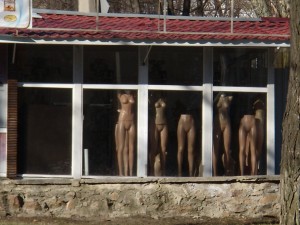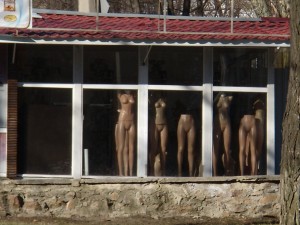
07.09.2015. www.delfi.lv, www.lsm.lv
Human being is a wonderful creature – he gets used to everything (in order to survive and not become insane), even to the things to which he should not get used. Over the period of occupation, we have accustomed ourselves to firing, dying people, ruined houses, the situation when the City is full of brawlers with weapons in their hands – occupants-“liberators”, to complete illiteracy and stupidity of the new “elite” of “DPR”, to constant danger, to spying and denouncing on the part of “responsible citizens”, to emptiness of the City, to disappearance of goods and the prices that grow in geometrical progression, even to the situation where a considerable part of our co-citizens have turned from once quite normal people into beings of some species who are cliché-ridden under the influence of Life News and Rossiya 24, having lost all the capability to select information, think, analyze. We have already become somehow used to living in this “wild field”. This is the protective mechanism of adaptation which works, otherwise one may not live to the victory. But the main thing is that it is necessary to be aware of that and not leave it unnoticed. We should not lose the sense of reality. That is because many people start writing diaries: by putting down impressions of a day, observations, we transform emotions into cognitive activity, “writing our stress out” in details and relieving our psychics. The result is that the diaries contain the facts which otherwise would be pushed out by the consciousness in the course of time.
Recently, I have repeatedly heard these frightening words: “Now it’s not so bad as it was last summer when the Girkin-Strelkov’s troops entered the City, then it was just horrible”. This phrase shows that the person remembers the initial stage of occupation as the peak of emotional experience, and, having adapted himself to life in the captured City, he has simply got used to the “horrors” that have come here, and he is unaware of this habit. It is this lack of consciousness which is frightening, for it is also one of the objectives of the in-crawling hybrid war: “make a person unconscious, and you’ll be able to lead him anywhere”.
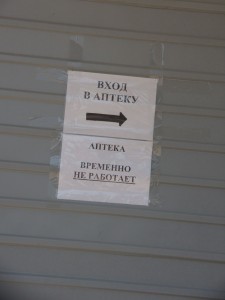
The events that took place in the summer of 2014 were really horrible: the City was filled with Russian military who had already “got intoxicated with blood” during fighting in Slavyansk, and their appearance made the local activists of “DPR” to cower and get worried, because the native leaders had been ready to become the masters here, but then they were forced to step aside. The state of military terror was introduced in the City: curfew from 10 p.m. to 6 a.m. was introduced (in reality, by 7-8 p.m., the streets were nearly empty), arrests of persons became increasingly frequent (even on the pretext of alleged support for Ukraine) – people were taken up even in the streets and in shops. In July 2014, I saw myself that two military persons brought a young man out of the supermarket “Brusnichka” (“Lingonberry”), and, having checked his documents, they “packed” him into their car where two more combatants with submachine guns on their shoulders were waiting for them at the store. Rare passers-by, averting their eyes, quickened their pace to get away as fast as possible. I will always remember expression on the faces of those brutes showing satisfaction from the fear of the passers.
In the same summer, firing on the City began, besides, it was done by the very combatants (on some occasions they were imitating shooting seemingly performed by the Armed Forces of Ukraine, and sometimes it was internal fight between their groups). It was that period, when many Donetsk residents left the City, many shops were closed (the remaining food stores were open till 5 p.m. at that time), nearly all the banks and drugstores, cafes and restaurants, sports clubs interrupted their activities, theatres finished their season prematurely. Public transport, according to the instruction issued by Girkin-Strelkov, had to end its workday by 8 p.m., but it was practically useless to wait, for example, for a tram already after 3-4 p.m. Besides, separate routes were reduced because of the installed “DPR’s” sentry posts, especially in the northern part of the City (the problematic for “DPR” area – Donetsk Airport – was also located there, and it was defended by Ukrainian soldiers who later on were called as “Cyborgs”). Combatants “displaced” cars from their owners, took away lodgings, captured the office of the “Red Cross”, blood transfusion station, ambulances (they were frequently used for transportation of arms), and the Kalinin Regional Hospital was turned into “Field Hospital of “DPR””. Besides, not only wounded combatants were treated there. Many Russian military persons seized the opportunity, undergoing medical examination, visiting a dentist, physiotherapist – all in all, they improved their health condition, sincerely admiring the competence of our doctors and inexpensiveness of medical services (of course, if we consider their “fighting-based” salaries!).
Yes, the situation was frightening at that time, just horrible. But the mind refused to perceive the reality, it seemed as if it was something impossible, at least as if it would be all over soon. The expectations were particularly strong when the Ukrainian Army, being considerably reinforced by volunteer battalions (many Donetsk residents had also joined them), began to liberate the captured by terrorists areas. But after the Ilovaisk tragedy, when Russia had sent its professional troops to support the “New Russians” who were under its supervision, it became clear that it would not end in the nearest future. And in that autumn, people gradually began to return, some more drugstores and shops were opened (they were mainly small food stores or spontaneously installed market places), as well as some restaurants in the City centre renewed their activities (in order the combatants have a possibility to “enjoy themselves”). But it did not mean that the situation improved. It meant that people began to adapt themselves to the life in occupation.
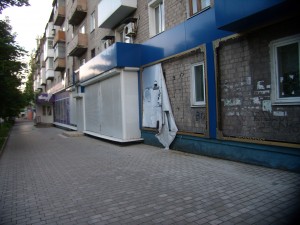
“Now it’s not so bad…” But is it true? You may consider yourselves. It looks as if the ambulances are not used anymore for transportation of combatants and their arms, they are used now according to their initial purpose. But whom are they carrying? Many medical personnel have left the City, although not all of them, of course. Parents of one of my friends once called an ambulance because her mother felt bad. They arrived, and their behaviour was odd (according to her father, they looked like “gypsy camp members”). Having explained nothing, they made some injection and took their departure, not leaving even the empty medicine ampoule. And after that injection, mom was in strange condition for several days – her reaction to external events was somehow delayed, she could not remember her relatives, and her thinking was also disturbed. It turned out that the following scheme was practised in the City: a group of deceivers in the appearance of medical personnel (maybe in reality even not being doctors) responded the person who had called free of charge ambulance, and arrived having in their mind the aim to look for apartments (owned mainly by single aged people) which could be “freed” by injecting the owner some narcotics, and, while the person was in such state, persuading him to sign a gift agreement regarding the apartment; or take possession of some valuable things. On that particular occasion, they failed because the old lady was not alone – my friend’s father, although being a sick man staying in bed, nevertheless having clear consciousness, he began to demand explanations, name of the medicine, etc. They were forced to retire. And when half a year later an ambulance was needed by her father (fortunately, my friend was staying with her parents at the moment), that time they, of course, called a pay ambulance “Boris”. Normal, sane doctors came, but the price of the service amounted to 900 hryvnas. And those were only difficulties regarding the ambulance, but the following cure involved more problems. It turned out that the district physician had also left and was replaced by some other one, but my friend, having observed her activities for some time, became doubtful about her competence of a doctor.
Yes, it is not so bad in Donetsk, the situation in regional small towns is worse. My friend in Torez once needed emergency cavity surgery, but they could not provide her with such service – there was lack of doctors, medicine and anaesthetic there. It was necessary to transfer her to Donetsk, Kalinin Regional Hospital. Luckily, on those days, no “heroic attacks” were performed by the “DPR” soldiers on separate occasions responded by firing on the part of the Armed Forces of Ukraine which sometimes reacted to the numberless provocations (as it was, for example, in the case of firing on Maryinka, the area under Ukraine’s control in late July 2015). In such situations, all the civil persons were urgently discharged to prepare the rooms for injured military. But the aforementioned was true only regarding surgery because of quite understandable reasons.
In cases when diagnosis does not require surgery, the situation is a little better. For example, on a hot summer day (in 2015), one of my friends had a heart attack right in a public transportation means. She was immediately brought to the department of cardiology of a hospital. The department had undergone few changes since the pre-war period – maybe just the rooms were emptier (less doctors and patients), and medicine was more expensive (the prices, like on everything else in “DPR”, were 2-3 times higher than those in the free part of Ukraine).
And these are only the instances of the events in some way connected with me, or known to me. But I am also unaware of many things. For example, how do the persons needing nephritic treatment – dialysis therapy – survive now? It is a complicated and expensive procedure to be applied three times per week. Previously such persons were registered, and they received haemodialysis free of charge (at the expense of the municipal budget). And what is the current situation?
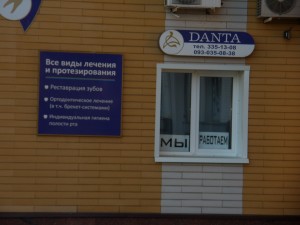
The sphere of dentist services has also some difficulties. Many dentist surgeries, private clinics have been closed, many dentists have left the City. The few remaining private clinics have placed information “We are open” next to their names (because people got used to the situation that everything was closed over the period of several months in the summer and autumn of 2014). They have both the personnel and equipment, but the prices “bite” – for example, a filling of medium complexity will cost approximately 800 hryvnas (the price of a similar service in the free part of Ukraine – 400 hryvnas).
Gynaecology is a special theme. Just imagine – Donetsk has been left by 600 – 700 thousand citizens, besides, they were mainly the young and medium aged persons. Gynaecology specialists expected decrease in the amount of their work to be done because the birth rate decreased, and they thought that a part of the departments would have to be closed. But it turned out that the volume of work increased, since the “influx” (military and volunteers from Russia) had caused enormous outburst of venereal diseases, besides, there were such kinds of diseases, which, to the specialists opinion, had already disappeared in that area long before. And after several months, the birth rate also began to grow. They were the girl-friends of combatants and the parturien women-combatants (some of them even have plastic cards of a soldier of “DPR” in their passports). Sometimes women-combatants complain that their commanders, having got information on the pregnancy, fired them, besides, a date that precedes the beginning of pregnancy was entered in the order. And similar measures are applied also to many wounded combatants who have got serious injuries and lost their ability to continue active fighting – they are discharged according to the orders containing dates previous to the wounding time.
Of course, birth is given also by average citizens of the City who had not been able to leave it because of some reason. And they face many problems; shortage of baby food, pampers, swaddling clothes, baby clothes, hygienic means, baby carriages, etc. These articles are insufficient in number, and they are very expensive. Initially, even in autumn, there appeared children second-hand shops where unnecessary things could be sold, and clothes for the next age period could be purchased for a relatively low price. Now young mothers are increasingly trying just to exchange things, thereby helping each other. They have not money enough to make purchases.
There exists a specific problem of food for prematurely born babies. Citizens collect money themselves on many occasions in order to purchase the food and transport it from the “Mainland” – free Ukraine. Last year, several children were saved in such way.
Young parents face one more problem – registering documents for the newly born child, because such documents are issued only with the stamp of “DPR” in Donetsk. Many people attempt to go to the area under control on the part of Ukraine and receive a birth certificate there. But lately, “DPR” supporters have not allowed children to leave the area without the appropriate documents. Furthermore, a similar problem is faced also by the citizens whose relatives died – death certificates are also issued only with a stamp of “DPR”. The very Civil Registry Office representatives recommend not to receive them here, for it is clear for everybody that they are not valid.
So, this is our “not so bad situation”…
Veronica
This article is the sixth in the series “Letters from Donetsk”, within which some Donetsk resident (her real name is not disclosed because of security considerations) shares her on-scene views on the military conflict ongoing in Ukraine.
